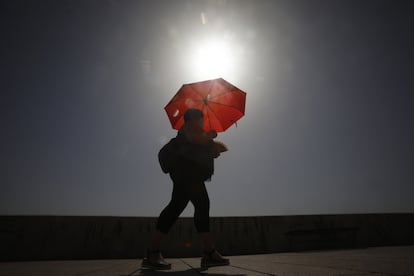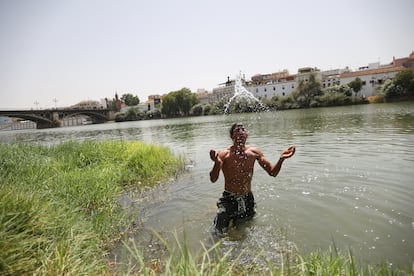Spain prepares for record-breaking high temperatures as heatwave intensifies
Meteorologists say the thermometer could reach close to 47ºC in the south of Spain, while in Madrid it could exceed 40ºC for three consecutive days

Spain is bracing for more high temperatures, with its first heatwave of the summer set to continue over the weekend. The heatwave, which began on Wednesday, is forecast to last until at least Monday, with temperatures between 5 and 10 degrees Celsius above average across most of the Spanish mainland.
Rúben del Campo, the spokesperson for Spain’s national weather agency Aemet, said there was a very real possibility that the country could see its hottest day on record during the heatwave. Spain recorded its highest temperature ever in July 2017, when thermometers in the southern province of Córdoba soared to 46.9ºC. That same day, it reached 47.3ºC near the municipality of Montoro in Córdoba, but because it was recorded at a weather monitoring station that was not part of the main network, it still needs to be validated. According to Del Campo, the temperature in Córdoba could rise above 46.9ºC on both Friday and Saturday.
What’s more, other areas of Spain could also see record-breaking heat. “The monitoring station in Retiro park in Madrid, recorded its record of 40.7ºC in 2019. There is the possibility that this record will be broken on Saturday, and it could also be the first time that it exceeds 40ºC three days in a row,” said Del Campo.

Robert Stefanski, an expert from the World Meteorology Organization (WMO), also warned the heatwave could break temperature records. “Having heatwaves in Spain in August is not unusual, but this level of intensity is,” he told EL PAÍS. “The Spanish temperature record is 47.3ºC [pending validation] and the temperature in the south of Spain could be near this figure this weekend, so it is very intense.”
According to Gaétan Heymes, a meteorologist from the French weather agency Météo-France, the worst day will be Saturday. “We are going to see some very high temperatures in Spain over the next two days, especially on Saturday, both during the day and at night. In Madrid, it could exceed 41ºC and in Córdoba, it could be close to 47ºC,” he said.
The heatwave has also put Spain on maximum alert for wildfires. In Catalonia, the regional climate action department warned the region was at the highest risk of wildfires in 18 years. The region has banned activities such as youth camps in the countryside and the use of agricultural machinery between 10am and 8pm in 279 municipalities, as well as in several natural areas. Authorities in Aragón, Castilla-La Mancha and Valencia also introduced measures on Thursday aimed at preventing fires.
Some areas in Spain have also opened cooling centers for residents who do not have air conditioning or other ways of coping with the heat. Castell-Platja d’Aro in Girona province has made two such centers available, while Barcelona has a network of 162 public facilities, such as museums, sports centers and libraries, that act as refuges from the heat. These spaces have been open all summer, but are more in demand during heatwaves.
Climate change
Spain is not the only country that is being affected by the heatwave. The extreme heat is also being felt across the Mediterranean. In Syracuse, in the south of Italy, the thermometer soared to 48.8ºC on Wednesday, while in the city of Kairouan in Tunisia it reached 50.3ºC. Both figures, however, still need to be validated by the WMO.
According to Antonello Pasini, an Italian climatologist, the high temperatures are linked to climate change. “The extreme phenomena that are happening in the Mediterranean and in Italy are due in great part to human-driven global warming and the emission of greenhouse gases into the atmosphere,” he said. “This global warming has made important changes in our latitudes, especially in the circulation of air. The equatorial-tropical circulation has widened towards the north, in such a way that African anticyclones, that used to remain over the Sahara desert, can now enter the Mediterranean.”
The soaring temperatures come just days after the United Nations Intergovernmental Panel on Climate Change (IPCC) released its damning report on the impact of human activity on the climate. The document found that human influence “has warmed the atmosphere, ocean and land,” and triggered profound changes in the climate, including rising temperatures and the proliferation of extreme weather episodes.
WMO official Stefanski warned that temperatures in Spain “will continue to rise until we reduce greenhouse gas emissions.” He added: “Extreme temperatures, increase in drought and an elevated risk of wildfires… These are the forecasts for the next 20 to 30 years.”
Between the 1980s and the 2000s, there were between 10 and 12 heatwaves per decade in Spain; around one a year. In the last decade (2010-2020), there were 24.
With reporting by Miguel Ángel Medina.
English version by Melissa Kitson.
Tu suscripción se está usando en otro dispositivo
¿Quieres añadir otro usuario a tu suscripción?
Si continúas leyendo en este dispositivo, no se podrá leer en el otro.
FlechaTu suscripción se está usando en otro dispositivo y solo puedes acceder a EL PAÍS desde un dispositivo a la vez.
Si quieres compartir tu cuenta, cambia tu suscripción a la modalidad Premium, así podrás añadir otro usuario. Cada uno accederá con su propia cuenta de email, lo que os permitirá personalizar vuestra experiencia en EL PAÍS.
¿Tienes una suscripción de empresa? Accede aquí para contratar más cuentas.
En el caso de no saber quién está usando tu cuenta, te recomendamos cambiar tu contraseña aquí.
Si decides continuar compartiendo tu cuenta, este mensaje se mostrará en tu dispositivo y en el de la otra persona que está usando tu cuenta de forma indefinida, afectando a tu experiencia de lectura. Puedes consultar aquí los términos y condiciones de la suscripción digital.








































